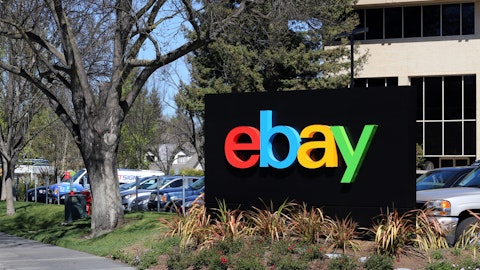In this article, we discuss 5 stocks in trouble as Americans cut back on spending. If you want to see more stocks in this list, check out 10 Stocks In Trouble as Americans Cut Back on Spending.
5. Farfetch Limited (NYSE:FTCH)
Number of Hedge Fund Holders: 45
Farfetch Limited (NYSE:FTCH) is a London-based company that offers online premium fashion retail services. The company provides clothes, shoes, accessories, and jewelry from hundreds of different brands. JPMorgan analyst Doug Anmuth on June 29 lowered the price target on Farfetch Limited (NYSE:FTCH) to $16 from $20 and maintained an Overweight rating on the shares. The analyst cut estimates and price targets on 26 companies in his interest coverage due to macro challenges, currency movement, and company-specific factors. With inflation reaching a 40-year high in May, fuel costs soaring 45% since February, credit card data showing softening consumer spending, and reduced consumer confidence, JPMorgan also expects a 66% chance of recession over the next two years and an 83% chance over the next three years, noted the analyst.
Among the hedge funds tracked by Insider Monkey, 45 funds were long Farfetch Limited (NYSE:FTCH) at the close of Q1 2022, compared to 47 funds in the earlier quarter. Stephen Mandel’s Lone Pine Capital is the biggest stakeholder of the company, with 17.20 million shares worth $260 million.
Here is what Polen U.S. Small Company Growth Fund has to say about Farfetch Limited (NYSE:FTCH) in its Q1 2022 investor letter:
“We also initiated a position in global luxury fashion e-commerce marketplace Farfetch in the first quarter and took advantage of meaningful weakness in the company’s share price during the period. Farfetch previously had too large a market cap for the Portfolio, but it has since moved to a level where it’s appropriate to own it – both in this Portfolio and in our smid-cap strategy. The company’s fundamentals remain attractive as indicated by the compelling results Farfetch reported in February.
The company remains an early mover with “the world’s only truly global marketplace for luxury at scale”. Farfetch has a broader reach around the world with a diversity of brands that is much larger than its competitors. Many of the items it sells are exclusive. Our research shows that its brand assortment, brand image, geographic breadth, an inventory-light business model, a more compelling offering for luxury partners, and artificial intelligence are all competitive edges for the company. We believe Farfetch is well-positioned for the continued market share shift from offline to online in this category. The personal luxury goods market has trailed other categories in online penetration, but consumer behaviors and preferences shifted as a result of the pandemic creating more comfort with purchasing goods like this online. Changed behavior and the general shift to a higher portion of Millennial and Gen Z luxury shoppers supports this continued shift as does the growth in emerging market demand.”





